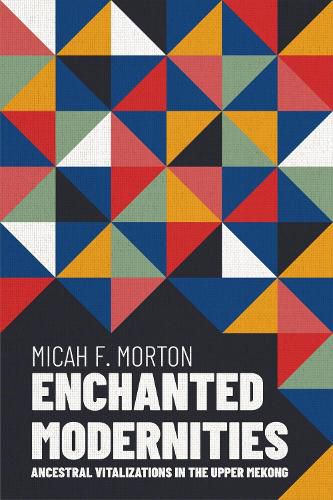Readings Newsletter
Become a Readings Member to make your shopping experience even easier.
Sign in or sign up for free!
You’re not far away from qualifying for FREE standard shipping within Australia
You’ve qualified for FREE standard shipping within Australia
The cart is loading…






Enchanted Modernities tells the story of an Indigenous community's work to decolonize and reclaim its collective ancestral identity. In this rich, theoretically informed ethnography, Micah F. Morton follows a transregional network of Indigenous Akha people from Thailand, Myanmar (Burma), China, and Laos as they spearhead a new movement for a pan-Akha identity. In the face of enormous historical and present-day colonialist pressures, this neo-traditionalist movement has focused on revitalizing (or "vitalizing," in Morton's suggestive term) Akha ancestral ways, preventing ongoing conversion to Christianity, and facilitating return conversion to the ways of the Ancestors. Morton focuses especially on the community's work to ensure their Ancestors live on and thus remain a dynamic part of their, and their descendants', lives.
Although modernity and its colonial legacies are often portrayed as severing or at least attenuating people's ancestral ties, Enchanted Modernities shows that those ties persist and, in fact, are on the rise. Akha and other Indigenous ancestral and animist resurgences are blossoming despite the paradigmatic Western framing of modernity as fundamentally at odds with Ancestors and, for that matter, kinship and even religion. Morton demonstrates that modernity and modernization proceed alongside the reproduction of new and old forms of enchantment.
$9.00 standard shipping within Australia
FREE standard shipping within Australia for orders over $100.00
Express & International shipping calculated at checkout
Enchanted Modernities tells the story of an Indigenous community's work to decolonize and reclaim its collective ancestral identity. In this rich, theoretically informed ethnography, Micah F. Morton follows a transregional network of Indigenous Akha people from Thailand, Myanmar (Burma), China, and Laos as they spearhead a new movement for a pan-Akha identity. In the face of enormous historical and present-day colonialist pressures, this neo-traditionalist movement has focused on revitalizing (or "vitalizing," in Morton's suggestive term) Akha ancestral ways, preventing ongoing conversion to Christianity, and facilitating return conversion to the ways of the Ancestors. Morton focuses especially on the community's work to ensure their Ancestors live on and thus remain a dynamic part of their, and their descendants', lives.
Although modernity and its colonial legacies are often portrayed as severing or at least attenuating people's ancestral ties, Enchanted Modernities shows that those ties persist and, in fact, are on the rise. Akha and other Indigenous ancestral and animist resurgences are blossoming despite the paradigmatic Western framing of modernity as fundamentally at odds with Ancestors and, for that matter, kinship and even religion. Morton demonstrates that modernity and modernization proceed alongside the reproduction of new and old forms of enchantment.